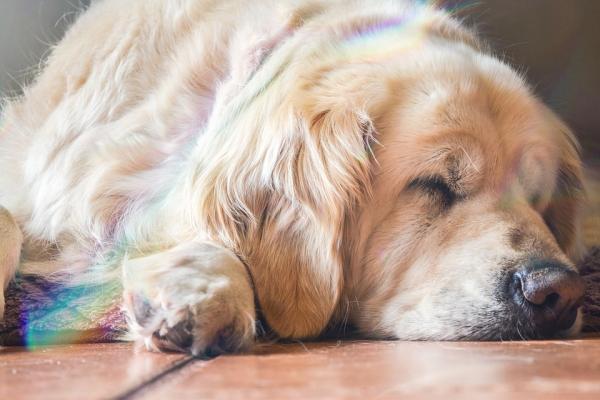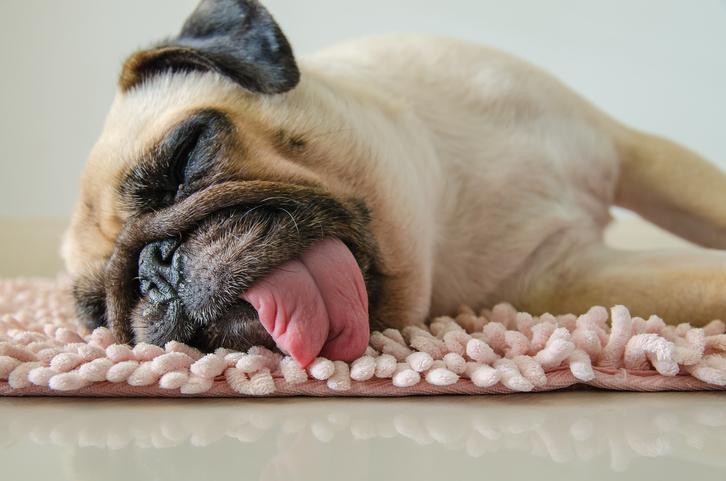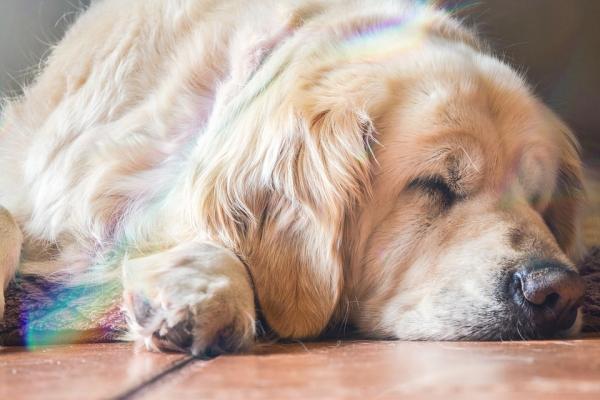Do Dogs Dream? - Understanding Canine Sleep Behavior



See files for Dogs
Have you ever watched your dog twitching paws or whimpering in their sleep? It's a common sight that leaves many wondering if dogs dream. The answer is yes! Dogs, like humans, experience sleep cycles that include periods of dreaming. Understanding our canine companions' dreams offers a fascinating glimpse into their inner world. It can also help us interpret their sleep behavior and ensure they're getting the restful sleep they need.
In the following AnimalWised article, we will discuss whether dogs dream, what they might dream about, and other intriguing aspects of their sleep cycle.
The sleep cycle of dogs
Just like humans, dogs rely on quality sleep to function at their best. During rest, they recharge their batteries, manage stress, and even consolidate memories. Ensuring your dog gets enough sleep in a quiet environment is crucial for their overall health and well-being.
Studies have revealed that dogs go through similar sleep phases to humans. By studying brain waves, researchers have identified two distinct phases:
- Slow-wave sleep: this is a period of relaxation, marked by a slower heart rate, regular breathing, and decreased muscle tension. During slow-wave sleep, your dog may remain somewhat alert, ready to respond to potential threats. This is why they might take short naps throughout the day without entering the next phase.
- Rapid eye movement (REM) sleep: Here, your dog enters a state of profound relaxation, virtually unaffected by external noises or movements. Their brain essentially disconnects from the outside world, allowing them to dream vividly. REM sleep is essential for cognitive function and emotional processing.
Dogs generally sleep more than adult humans – 8 to 13 hours compared to 7 to 9 hours for adults. This difference is due to shorter sleep cycles in dogs. These cycles include both light and deep sleep phases that repeat throughout the day.
Puppies and senior dogs nap more frequently than adult dogs, while napping is less common for humans, although it can be beneficial for overall health.
Is your dog sleeping more than usual? While increased sleep can be normal in some cases, it could also be a sign of an underlying health issue. Learn more about the potential causes and when to see a vet in this other article.

Do dogs dream?
Yes, dogs dream. While we can't directly peek into a dog's mind, scientists have strong evidence that dogs do dream.
During sleep, both humans and dogs experience REM (Rapid Eye Movement) sleep. This stage is characterized by rapid eye movement and specific brainwave patterns. Studies using EEG (electroencephalogram) machines have shown similar brainwave activity in dogs during REM sleep as in humans during dreaming.
Not only that but scientists have observed dreaming behavior in other mammals, including cats and primates. The evolutionary similarities between dogs and these animals, along with the shared REM sleep stage, suggest that dogs likely dream as well.
REM sleep is thought to play a role in memory formation. Activities and experiences from a dog's waking life, such as playing fetch or encountering a new stimulus, might be replayed and processed during dreams. This could help solidify memories and refine skills learned during the day.
What do dogs dream about?
While the exact content of a dog's dreams remains a mystery, researchers believe their dreams are likely connected to their daily experiences. Humans might dream about complex social interactions, problem-solving scenarios, or abstract concepts. Dogs, on the other hand, might dream more about basic needs and instincts, such as chasing prey, playing fetch, or interacting with their human companions.
Dogs rely heavily on their senses to navigate the world. Sights, smells, and sounds that capture their attention while awake could be incorporated into their dreams. This might involve reliving the excitement of encountering a particular scent or the frustration of being unable to reach a tempting object.
Dogs are social animals, and their dreams might feature encounters with familiar companions. This could involve reliving positive social interactions with other dogs or humans, such as playtime with other animals or cuddling with their favorite person.
It's important to note that these are educated guesses based on current scientific understanding. Further research is needed to definitively determine the content of dog dreams.
What do dogs dream when they cry?
Unfortunately, science can't definitively tell us what dogs dream about, let alone what they dream about when they whimper or cry in their sleep.
Similar to humans, dogs might have nightmares that replay negative experiences or anxieties. These could be related to recent events like separation anxiety, loud noises, or encountering something scary. However, keep in mind that sometimes even positive emotions experienced during a dream can manifest as whimpering or vocalizations. Just because your dog is vocal doesn't necessarily mean they're having a bad dream.
If your dog is whimpering and seems restless during sleep, they might be experiencing physical discomfort. This could be due to pain, hunger, or needing to use the bathroom.
Wondering about your dog's foot-sleeping habit? Check out our other article for answers.
Why is my dog twitching in their sleep?
Just like humans act out dreams sometimes, dogs exhibit physical signs that suggest they're experiencing something in their sleep. The most likely reason your dog is twitching in their sleep is because they're dreaming. Dogs naturally exhibit movement and various behaviors while asleep, particularly during the REM (Rapid Eye Movement) phase of sleep. Although the brain limits body mobility during this phase for safety, some movements may still occur.
Less frequently, other factors could contribute to your dog's sleep spasms. Stressful events or anxieties might manifest in dreams, resulting in more pronounced twitching or vocalizations. Additionally, discomfort such as pain, hunger, or the need to relieve themselves could also cause restlessness and twitching during sleep.
Owners may observe their dog's behaviors aligning with what they might be dreaming about. For instance, if a dog is dreaming about chasing a ball, they may see corresponding movements like leg motions as if running, tail wagging, or occasional barking. Just like humans, dogs might display facial expressions during sleep that reflect the emotions they're experiencing in their dreams. A relaxed expression might indicate a peaceful dream, while a furrowed brow or bared teeth could suggest a more stressful dream experience.
Although their eyelids are closed, your dog's eyes might be darting rapidly beneath them during REM sleep. This rapid eye movement, similar to what humans experience, is thought to be linked to the visual aspects of dreaming.
REM sleep can cause changes in breathing patterns. Your dog's breathing might become shallower and faster, mimicking the exertion they might experience while acting out their dreams.
It's important to note that sleep activity can vary among dogs, with some being more active while others are relatively still. Lack of movement during sleep doesn't necessarily indicate the absence of dreaming, as this can vary from dog to dog.
Spasms or jerky movements during sleep are typically not concerning unless they also occur when the dog is awake. In such cases, consulting a veterinarian is advisable to rule out any underlying issues.
Curious about what your dog's sleeping position reveals? Dive deeper into the meaning of doggy dreams in our other article.
If you want to read similar articles to Do Dogs Dream? - Understanding Canine Sleep Behavior, we recommend you visit our Facts about the animal kingdom category.
- Coren, S. (2012). Do Dogs Dream?: Nearly Everything Your Dog Wants You to Know . W. W. Norton & Company.






